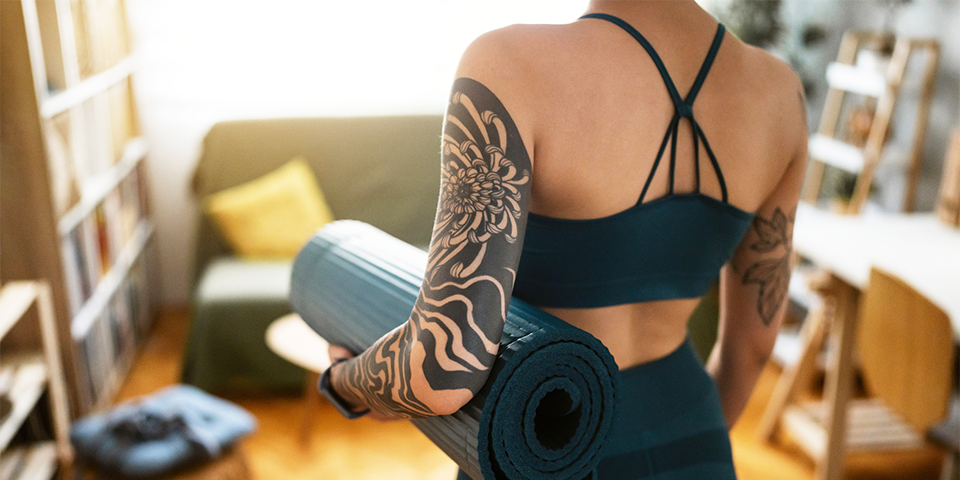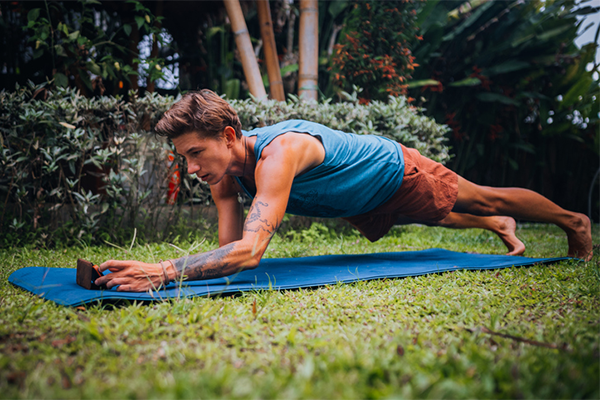If you’re considering getting a tattoo, or you just got a new one, you may be wondering: Can you work out after getting a tattoo?
The short answer: To allow your skin to fully heal, your tattoo artist will likely caution you to avoid strenuous activity for a little while.
You don’t need to be a couch potato for weeks on end. But a tattoo is an open wound, so you should take it slow for a bit.
With tattoos becoming increasingly common — three in 10 Americans have at least one of them — healthcare professionals and tattoo artists have a better idea of how to care for fresh ink.
Here’s what you need to know about working out safely while allowing your tattoo to heal properly.
Is Sweat Bad for a New Tattoo?
Sweat may interfere with the healing process for a new tattoo, cautions Ashley “Love” Paige, owner of Maryland-based tattoo studio Artizmylov.
Remember that freshly tattooed skin is damaged skin, and it’s crucial to take care of the area in order to help prevent infection.
So you may want to pause any workouts that leave you completely drenched in sweat.
“Sweat early in the healing process can cause irritation of the open wound and potentially affect the color of the ink,” says Jason Miller, MD, a board-certified dermatologist and medical director at Schweiger Dermatology Group.
How Long Should You Wait to Work Out?
“Many professionals recommend waiting two days before exercising to prevent sweat from irritating the fresh tattoo wound,” Miller says.
This is the bare minimum, but everyone heals differently — so you may need to wait up to two weeks to get back into your normal fitness routine.
Tattoo placement and size can affect the exact timing of when you can comfortably and safely get back to your workout routine.
“Larger tattoos over the trunk may affect range of motion, so exercise may be limited for a few days,” Miller says. “Smaller localized tattoos will likely have fewer restrictions.”
If you got a tiny four-leaf clover on your foot, for example, you may be ready for an arm workout within a few days.
However, if you’re rocking a brand-new trident tattoo across your upper back, you may want to wait a bit longer before you start working out again.
Before you plan to exercise, Love recommends checking with your tattoo artist who will be able to provide a more accurate timeline based on your specific ink.
What Exercises Should You Avoid After Getting a Tattoo?
Miller advises people to avoid exercises that may cause friction or pressure in the area of your new tattoo, which can prolong the healing process.
For instance, you wouldn’t want to do planks on a freshly-inked forearm or bench presses while a back tattoo is still healing.
Love also recommends avoiding any activities that can potentially cause trauma to the newly tattooed area, such as contact sports.
And keep your workouts on dry land until your tattoo has fully healed. Pool chemicals can irritate your skin and wreak havoc on the ink, so Miller suggests that people avoid swimming for at least two weeks.
“This would also include outdoor swimming in lakes or the ocean where bacteria can contaminate the area and slow the healing process,” he adds.
8 Tips for Working Out Safely After Getting a Tattoo
Follow these tips to ease back into your regular routine post-tattoo.
1. Practice proper tattoo aftercare.
Keep the area clean and moisturized with an ointment recommended by your tattoo artist.
“Cleaning your tattoo and applying ointment with clean hands are the best things you can do to promote healing,” Love says.
2. Take a few rest days.
You may be itching to get back to your normal routine, but look at it this way: Jumping back into strenuous activity right out of the gate could put you at risk for irritation or infection, which would keep you out of the gym even longer.
3. Ramp up slowly.
Love advises people with fresh ink to start slow and find exercises that do not cause discomfort.
“Walking and taking long breaks in between sets to minimize sweat is the best game plan,” she says.
4. Keep it clean.
Once you get back to your regularly scheduled programming, Miller recommends using a dressing that covers your tattoo in order to protect it from bacteria.
Sanitize all equipment, and try to avoid direct contact between your tattoo and the gym floor, mat, and other equipment.
Remember to clean and moisturize your tattoo immediately after your workout.
5. Wear loose-fitting workout gear.
Miller suggests opting for comfortable, loose-fitting clothing that does not rub over the tattooed area while it’s still healing.
Avoid any restrictive clothing, footwear, or equipment that may rub against a fresh tattoo and cause irritation — like a tight sports bra over a shoulder tattoo, pedal cages over a foot tattoo, or a resistance band looped around an ankle tattoo.
6. Stay out of the sun.
Exposing a healing tattoo to ultraviolet radiation from the sun can cause it to scar or scab over. That’s why it’s especially important to keep your fresh ink out of the sun, at least for the first one to three weeks after you get your tattoo.
7. Watch for warning signs.
After you get a tattoo, you’ll probably notice some swelling and redness followed by soreness and itchiness. That’s all a part of the normal healing process.
But if your tattooed skin becomes infected, you may experience more serious symptoms like worsening pain, redness, fever, chills, or open sores.
If you notice any signs of a possible infection, contact a healthcare professional ASAP.
8. Be patient.
It’s important to allow your body time to heal from a tattoo, so don’t rush back into your normal routine.
Be mindful of the types of workouts you choose, and listen to your body — if a specific exercise or stretch feels uncomfortable, stop until you’ve had more time to heal.




